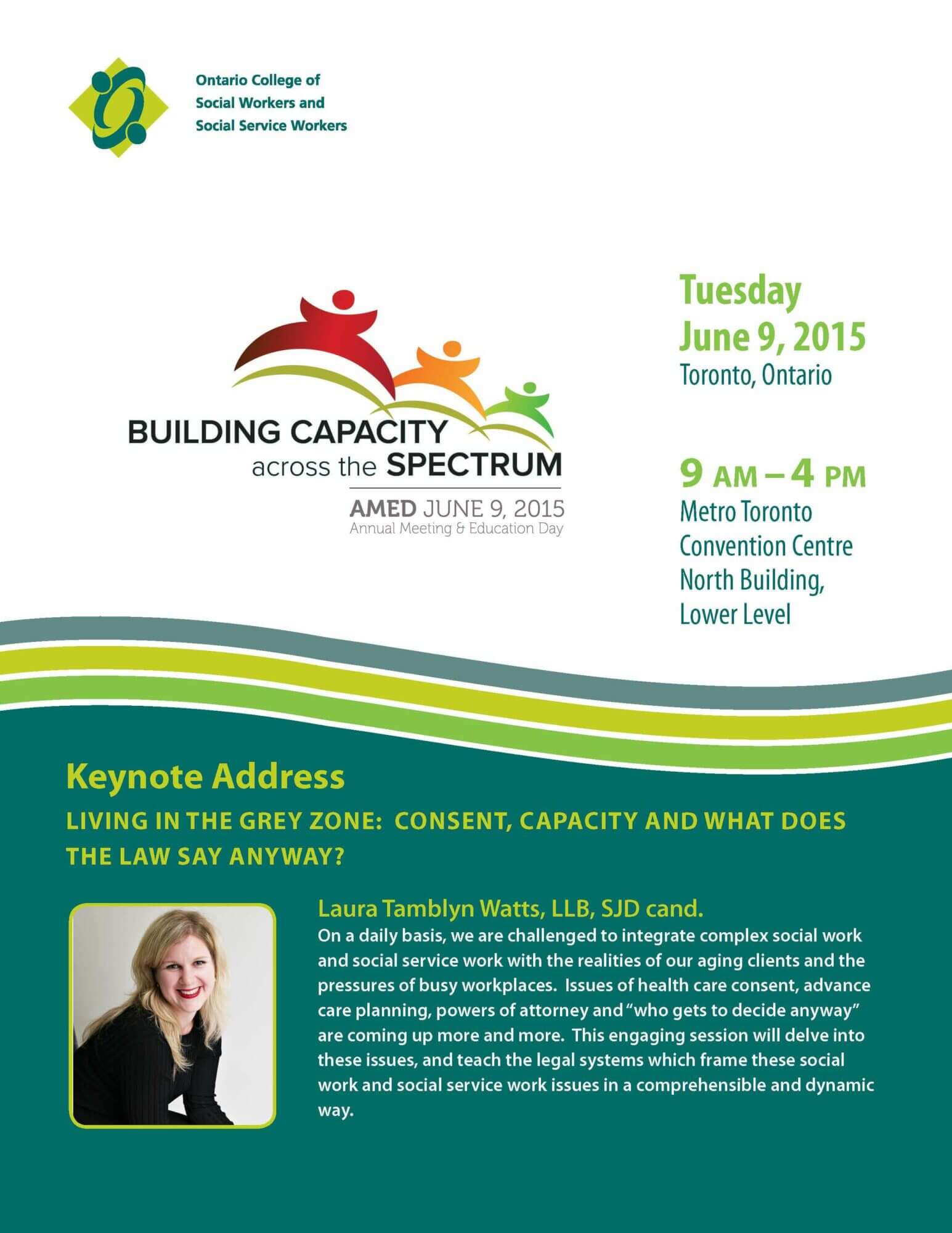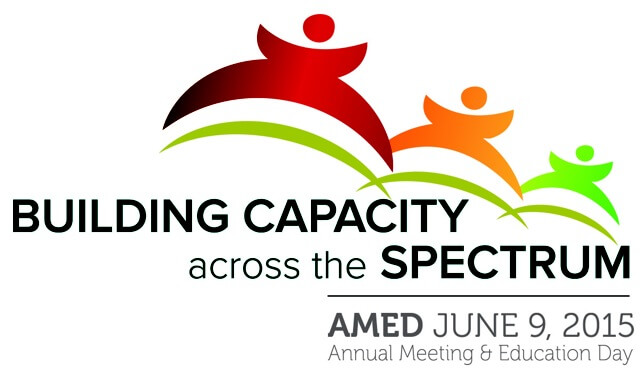Annual Meeting and Education Day Overview
8:30 – 9:00 a.m.
Registration
9:00 – 10:30 a.m.
Annual Meeting
11:00 a.m. – 12:00 p.m.
Keynote Address
12:00 – 1:30 p.m.
Lunch
1:30 – 2:30 p.m.
Breakout Sessions A
2:45 – 3:45 p.m.
Breakout Sessions B

President’s Report – Beatrice Traub-Werner, MSW, RSW
Acting Registrar’s Report – Lise Betteridge, MSW, RSW
Keynote Speaker – Laura Tamblyn Watts, LLB, SJD cand.
Living in the Grey Zone: Consent, Capacity and What Does the Law Say Anyway?
Law, Ethics & Decision-making PowerPoint Presentation
Afternoon Concurrent Sessions
Session A – 1:30 – 2:30 p.m.
A1 – Making a Difference in Housing and Homelessness Services
Deborah Filice, RSSW
The provision of safe and affordable shelter demands extensive legislative and program knowledge together with strong professional principles and leadership skills. A career in the housing profession connects people with their community and provides an opportunity to see concrete outcomes and positive change for those persons who experience barriers in participation and self-fulfillment. Through strategic partnerships and innovative thinking it is possible to deliver best practices and coordination of services. This workshop will provide greater understanding of career opportunities in social work and social service work and the field of housing services.
Click on the following link to view the PowerPoint presentation in PDF format:
A1 – Making a Difference in Housing and Homelessness Services
A2 – Unpacking Internalized Ableism: Counselling People with Vision Loss
Lisa Derencinovic, MSW, RSW
This workshop will discuss the practice experiences of a visually-impaired social worker working with those adjusting or living with vision loss, including common patterns in the adjustment process. It will also include a discussion of models of disability and how negative perceptions of people with disabilities are internalized into negative self concepts. Reflections from the field, both as a worker with a disability and working with clients who have disabilities, will inform this workshop.
Click on the following link to view the presentation in a Word document:
A2 – Unpacking Internalized Ableism: Counselling People with Vision Loss
A3 – Ethics and Social Work practice: A Case of Pediatric Transplantation
Andrew Mantulak, RSW
In the routine clinical practice of initiating dialysis and transplant therapy for children with end stage renal disease, parents and health care providers often rely on notions of ‘best interest’ to reach consensus regarding treatment options. In most cases such decisions are made collaboratively however ‘best interest’ becomes ambiguous when parents in their role as substitute decision makers for their children contest the treatment plan prescribed by health care professionals. This talk will outline the role of values and beliefs in such cases and the ethical dilemmas facing social workers and social service workers in the process of enacting their role as family advocate and interdisciplinary team member.
Click on the following link to view the PowerPoint presentation in PDF format:
A3 – Ethics and Social Work practice: A Case of Pediatric Transplantation
A4 – Mindfulness Based Cognitive Therapy (MBCT)
Gwen Morgan, MSW, RSW and Larry Borins, MSW, RSW
Clinically effective in reducing the risk of relapse for people who suffer with recurrent depression, Mindfulness Based Cognitive Therapy (MBCT) is proving to have broader applications in helping people free themselves from anxiety, stress, chronic unhappiness and exhaustion. In this Mindfulness seminar, we will explore the foundations of MBCT. As a participant, you will experience mindfulness and take away mindfulness practices and resources to build greater resiliency in your own life, and the lives of the people you help and serve.
Click on the following link to view the PowerPoint presentation in PDF format:
A4 – Mindfulness Based Cognitive Therapy (MBCT)
Afternoon Concurrent Sessions
Session B – 2:45 p.m. – 3:45 p.m.
B1 – We Are All Connected: Working with Clients Who Overuse Technology
Lisa Pont, MSW, RSW
Technology is a part of daily life for most of us and impacts the way we work, love and play. Some online activities, such as gaming, gambling and social networking, can be particularly compelling and create imbalance in both our own, and our clients’ lives. This presentation will explore the impact of technology overuse on our clients and allow participants to reflect on their own use. Information about the prevalence of this issue, risk factors, screening/assessment and current treatment practices will be discussed.
Click on the following link to view the PowerPoint presentation in PDF format:
B1 – We Are All Connected: Working with Clients Who Overuse Technology
B2 – Counselling Clients with Autism
Wendy Arscott, RSSW
How do you provide support to a client who is on the autism spectrum? Counselling clients diagnosed with autism needs a different set of parameters. Clients may present with any number of unique issues, but the way clients are approached may mean success or not. Are you aware of their sensory or anxiety issues? Special consideration is needed when offering options. What concurrent diagnoses may be impacting the process? Join Wendy Arscott, RSSW, BEd, MEd, in discovering techniques and strategies to make counselling more responsive to persons who may be hesitant to participate in the process.
Click on the following link to view the PowerPoint presentation in PDF format:
B2 – Counselling Clients with Autism
B3 – Public Policy and LGBTQ Populations: Social Work with Gender and Sexually Diverse People
Nick Mulé, RSW
This presentation will provide a brief historical overview of public policy in Ontario and Canada regarding the lesbian, gay, bisexual, transsexual, transgender and queer (LGBTQ) populations. Current legislation will be reviewed along with its implications on ethics and standards of social work and social service work practice in working with gender and sexually diverse communities. How the social work and social service work disciplines recognize LGBTQ people and what current social issues these communities continue to face will be examined and discussed.
Click on the following link to view the PowerPoint presentation in PDF format:
B3 – Public Policy and LGBTQ Populations: Social Work with Gender and Sexually Diverse People
B4 – In Our Own Words: Writing about Practice
Karen Gold, MSW, RSW
The professional lives of social workers and social service workers are saturated with stories. This workshop will provide an overview of the often-ignored ‘storytelling voice’ in professional practice and the role of narrative in capturing the richness and messiness of day-to-day practice. Using stories and poetry by practitioners as a springboard for reflection and discussion, we will explore writing as a versatile tool for self-awareness, advocacy and resiliency. Participants will come away with an appreciation of the emerging field of narrative studies and strategies to enrich their personal and professional lives through reflective writing.
Click on the following link to view the PowerPoint presentation in PDF format:
